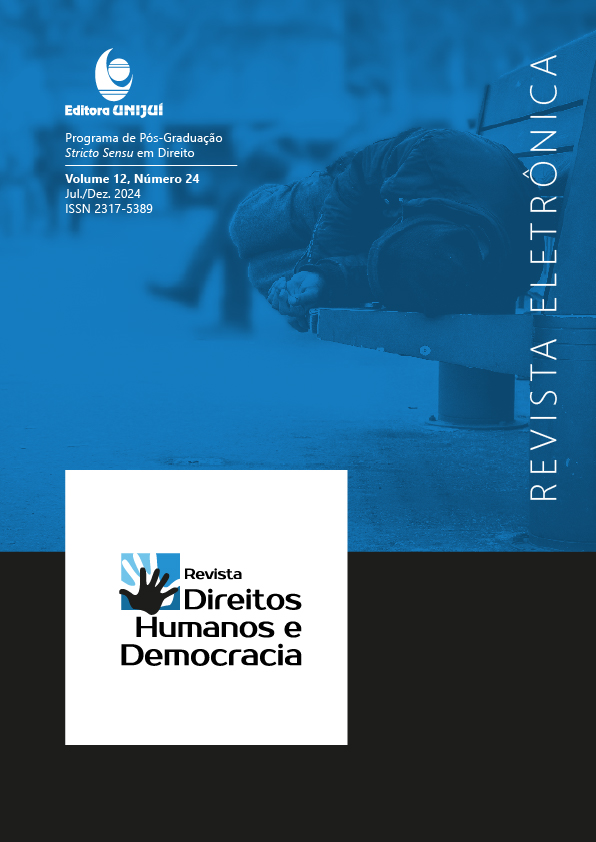Hermeneutical weighting on the effectiveness of fundamental rights in the brazilian state
DOI:
https://doi.org/10.21527/2317-5389.2024.24.16125Keywords:
Fundamental Rights, Human Dignity, Federal ConstitutionAbstract
This article will analyze the dignity of the human person as the foundation of the Federative Republic of Brazil, promoting a legal debate on doctrinal meanings, in order to awaken new interpretations on the topic in the reader. In a clear and objective manner, a philosophical and legal analysis be will proposed on the foundations that guarantee human dignity based on the observance of fundamental rights, taking into account the postulates provided for in the Federal Constitution of 1988. The methodology developed throughout this study based was on by the dialectical method, based on a careful bibliographical review of books, articles, dissertations and magazines, starting with the formulation of the problem, searching for research sources, analyzing the selected material and comparing the topic with other knowledge sciences. It concluded is that the meaning of human person intrinsically is related to the condition of subject of rights. This means that all people be must treated with dignity through the realization of fundamental rights, thus confirming the original legislator's option for a Democratic State of Law.
References
ABADE, Denise Neves. Direitos fundamentais na cooperação jurídica internacional: extradição, assistência mútua, execução de sentença estrangeira e transferência de presos. São Paulo: Saraiva, 2013.
AGRA, Walber de Moura. Curso de Direito Constitucional. 8ª.ed. Rio de Janeiro: Forense, 2014.
BARROSO, Luís Roberto. O direito constitucional e a efetividade de suas normas. 7 ed. Rio de Janeiro: Renovar, 2003.
BÖCKENFÖRDE, Ernst-Wolfgang. Escritos sobre derechos fundamentales. Tradução de Juan Luis Requejo Pagés e Ignacio Villaverde Menéndez. Baden-Baden: Nomos Verlagsgesellschaft, 1993.
BONAVIDES, Paulo. Curso de direito constitucional. 34. ed. São Paulo: Malheiros Editores, 2019.
BRASIL. Constituição da República Federativa do Brasil: de 5 de outubro de 1988. Alexandre de Moraes, organizador. 29. ed., São Paulo: Atlas, 2008.
BUENO, José Antônio Pimenta. Direito público brasileiro e análise da constituição do império. Rio de Janeiro: Ministério da Justiça e Negócios Interiores, 1958.
COMPARATO, Fábio Konder. O Poder Judiciário no regime democrático. In. Estudos Avançados, vol. 18, n. 51, p. 151-159. São Paulo, Maio/Agosto, 2004. Disponível em: https://www.revistas.usp.br/eav/article/view/10004. Acesso em: 11 mai. 2024.
DANTAS, Paulo Roberto de Figueiredo. Curso de direito constitucional. 3. ed. São Paulo: Atlas, 2014.
DIMOULIS, Dimitri; MARTINS, Leonardo. Teoria geral dos direitos fundamentais: revista, atualizada e ampliada, 5ª ed. São Paulo: Atlas, 2014.
FONTE, Felipe de Melo. Políticas públicas e direitos fundamentais: elementos de fundamentação do controle jurisdicional de políticas públicas no Estado Democrático de Direito. 2ª. ed. São Paulo: Saraiva, 2015.
FERRAZ JÚNIOR, Tércio Sampaio; DINIZ, Maria Helena; GEORGAKILAS, Ritinha Alzira Stevenson. Constituição de 1988: legitimidade, vigência e eficácia, supremacia. São Paulo: Atlas, 1989.
GOMES, Ana Cláudia Nascimento. MORAIS, Roberta Jardim. De uma visão jurídico constitucional a uma proposta pragmático-econômica dos direitos sociais: Cooperação e cooperativa. In. ROCHA, Carmem Lúcia Antunes (Coord.). O Direito a Vida Digna. Belo Horizonte: Fórum, 2004.
NOVELINO, Marcelo. Manual de Direito Constitucional: Volume Único: 8ª ed. São Paulo: Editora Método, 2013.
PADILHA, Rodrigo. Direito Constitucional. 4ª. ed. Rio de Janeiro: Forense; São Paulo: Método, 2014.
PINHO, Rodrigo César Rebello. Teoria geral da constituição e direitos fundamentais. 11ª. ed. São Paulo: Saraiva, 2011.
QUEIROZ, Cristina. Direitos fundamentais sociais: questões interpretativas e limites de justiciabilidade. In: SILVA, Virgílio Afonso da (org.). Interpretação constitucional. São Paulo: Malheiros, 2010.
RODRÍGUEZ-ARANA MUÑOZ, Jaime. Direito fundamental à boa Administração Pública. Tradução Daniel Wunder Hachem. Belo Horizonte: Fórum, 2012.
SARLET, Ingo Wolfgang. A eficácia dos direitos fundamentais: uma teoria geral dos direitos fundamentais na perspectiva constitucional. 13ª. ed. rev. e atual. Porto Alegre: Livraria do Advogado, 2018.
SARMENTO, Daniel. Direitos fundamentais e relações privadas. 2ª ed. Rio de Janeiro: Lumen Juris Editora, 2010.
SILVA, José Afonso da. Curso de direito constitucional positivo. 34. ed. São Paulo: Malheiros, 2011.
SILVA, Virgílio Afonso da. Direitos fundamentais: conteúdo essencial, restrições e eficácia. São Paulo: Malheiros, 2009.
VIANNA, Luiz Werneck. Poder Judiciário, “positivação” do direito natural e política. Estudos Históricos, vol. 9, n. 18, 1996.
Downloads
Published
How to Cite
Issue
Section
License
Copyright (c) 2024 Human Rights and Democracy Journal

This work is licensed under a Creative Commons Attribution 4.0 International License.
By publishing in the Revista Direitos Humanos e Democracia, authors agree to the following terms:
Articles are licensed under the Creative Commons Atribuição 4.0 Internacional (CC BY 4.0), which allows:
Share — copy and redistribute the material in any medium or format;
Adapt — remix, transform, and build upon the material for any purpose, including commercial use.
These permissions are irrevocable, provided the following terms are respected:
Attribution — authors must be properly credited, with a link to the license and indication of any modifications made;
No additional restrictions — no legal or technological measures may be applied that restrict the use permitted by the license.
Notices:
The license does not apply to elements in the public domain or covered by legal exceptions.
The license does not grant all rights required for specific uses (e.g., image rights, privacy, or moral rights).
The journal is not responsible for opinions expressed in the articles, which remain the sole responsibility of the authors. The Editor, with the support of the Editorial Committee, reserves the right to suggest or request modifications when necessary.
Only original scientific articles presenting research results of interest, not previously published or simultaneously submitted to another journal with the same purpose, will be accepted.
References to trademarks or specific products are intended solely for identification purposes and do not imply any promotional endorsement by the authors or the journal.
License Agreement: Authors retain copyright over their articles and grant the Revista Direitos Humanos e Democracia the right of first publication.













